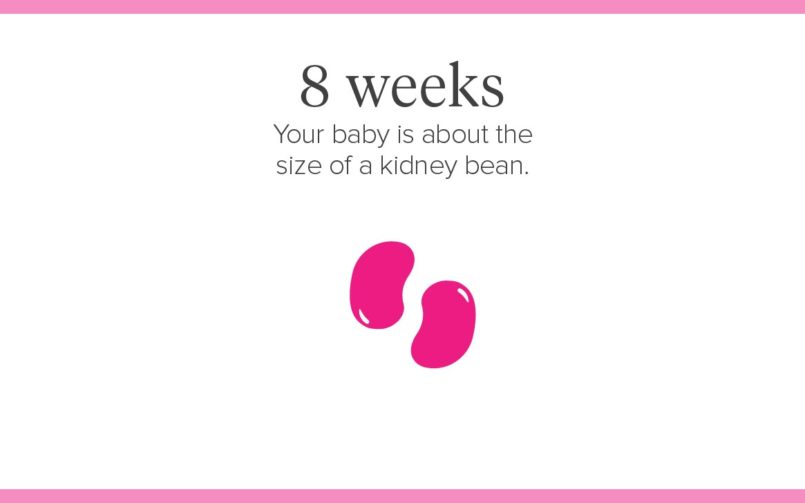
Week 8 Pregnancy – What to Expect, Symptoms and Other Details
As you are reaching the end of 1st trimester, you might experience your clothes fitting even tighter. Usually, you gain only a few pounds of weight. Your uterus might be expanding eventually to accommodate the rapid growth of your baby. The breasts might also feel tender and fuller. During pregnancy, blood volume raises to over 45%. Even in this stage, discomforts and changes happen because your body evolves with its new changes and requirements.
Your Child
The little one might look like a kidney bean, i.e. around 11 to 14 mm. A child looks more like a newborn, but her body has grown tiny legs and arms, toes and fingers, muscles, and bones. She has still not developed her unique facial features, and she is developing well with all of their inner organs and processes.
Twin Growth
If you are carrying twins, they will measure around ½” long. They will appear more as babies. They have well-formed ears, long arms, and sprouted out the nose and upper lip. A mother carrying twins (or more) will have to consume more nutrients than other women carrying single babies, such as folic acid, calcium, protein and iron. Some women have more intense symptoms and a higher risk of complications.
Symptoms
You might have the following symptoms in this stage –
- Fatigue
- Tender or sore breasts
- Slight weight gain
- Morning sickness
- Problem in sleeping
- Need to pee constantly
- Nausea
- Heartburn
This week, you will regularly feel tired. If not, hormone levels are still growing, and you might soon feel morning sickness around week 10. Don’t assume that morning sickness affects you only when you wake up. To relieve your nausea, munch on crackers eventually.
When should you see your gynecologist?
If you experience a sudden decline in symptoms, don’t worry. Symptoms like nausea and sore breasts usually come and go regularly. Ask your gynecologist if you have other issues or you are not feeling well. Vaginal bleeding or cramping and passing or cramping vaginal tissue could be the sign of miscarriage. Sometimes, miscarriage has no signs. Ultrasound is probably the only way to discover miscarriage for women who don’t have any symptom.
There is around 15% chance of miscarriage in this stage. Obviously, you won’t want this to happen. Chromosomal anomalies are one of the common causes of miscarriage. But after eight weeks, the risk of miscarriage reduces to 1.5%, according to a study conducted in 2008.
But it doesn’t mean you have to worry. Keep eating well, avoid alcohol and smoke, and refrain from caffeine to lead a healthy lifestyle.